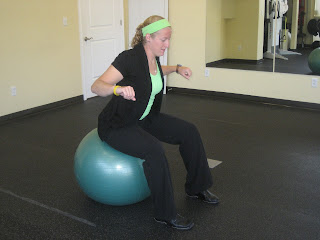There are ways to minimize the down time!
1) Most people plan spinal surgery. Get into a physical therapist that knows how to delicately strengthen/balance the core as much as possible prior to surgery. What strength we have before hand DOES help us bounce back afterwards. Get to know what it feels like to fire the appropriate muscles so you can "turn them back on" sooner rather than later after surgery.
2) Obtain your surgical report and contact details of your surgery/surgeon for your PT for post surgical care. This will help communication between therapist and surgeon of the definite DON'Ts after surgery.
3) Give yourself time to recover, however get back to firing some muscles supporting your core asap.
A ball can be a great tool to just sit on (or lightly bounce) in your brace (if you are wearing one) post surgery. Prior to surgery, I would highly recommend acquiring one and getting confident in utilizing it in different positions.
My intern is pictured here performing a mid row on the ball.
Without inducing much stress to the lumbar spine,
one can maintain strength in the upper back
to help with returning to upright posture post surgery.
A Pilates Reformer has spared a lot of grief for my post lumbar fusion patients. Laying on your back is usually a position of comfort (or add a pillow for greater comfort) secondary to stabilizing your spine better by simply laying on it.
Just pushing back and forth with your feet
will increase circulation
and help alleviate pain
post surgery
without much stress to the lumbar spine.
You can even get out of your brace (if you're wearing one post surgery)
to typically do these exercises.
Bottom line, research supports early movement and firing of the core muscles to prevent the laying down of adipose (fat) tissue where muscle should be to help support your back after spinal surgery for many years to come. If you've had spinal surgery, I can only say, that it is in your best interest to maintain a regular core program for the rest of your life. Remember, physical therapists do not specialize in surgery and must be in communication with your surgeon; a surgeon does not specialize in rehabilitation and should consider the physical therapist's expertise on appropriate exercise instruction.
More information: INFUSE Bone Graft, used commonly in spinal fusion surgery, has been linked to some severe side effects, http://www.drugwatch.com/


No comments:
Post a Comment